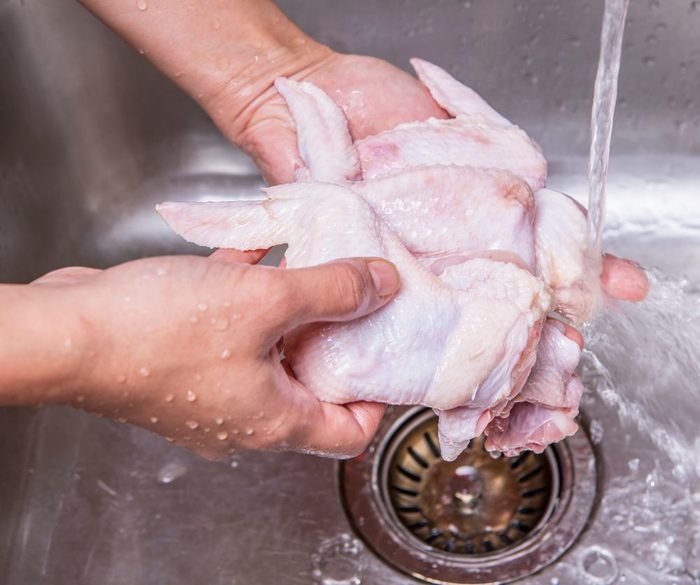Here’s Why You Should Never Wash Chicken Before Cooking It

If you've always washed your chicken, it may be time to reconsider this potentially dangerous practice.
It’s the most polarizing problem in poultry—should you wash your chicken before cooking it? Food health and safety professionals are advising against this practice, as it can increase the spread of bacteria and the risk of cross-contamination. Carefully handling your raw chicken during preparation is key to avoid food poisoning.
(Related: How to Tell the Difference Between Food Poisoning and a Stomach Bug)
What happens if you wash raw chicken?
Most people who clean their chickens think they’re washing germs or sliminess from the chicken. And while they’re correct in assuming that raw chicken is often teeming with bacteria, such as campylobacter or salmonella, washing it with water does nothing to combat this.
In fact, washing your chicken actually worsens this problem, according to the Government of Canada, because the chicken’s bacteria can spread wherever the water splashes.
The USDA maintains that the only sure way to eliminate bacteria is to cook chicken to the proper temperature, and these rules extend to other types of meat and fish as well.
The minimum temperature of cooked chicken should be 165 degrees, and a good way at determining that temperature is using a meat or instant-read thermometer like this one.
Even professional chefs have been divided on this issue. Julia Child was a staunch supporter of washing chicken, while Ina Garten more recently came out on her show to reinforce that there is no need to wash it or other meats.
Garten’s side has the science to back it, and, the potential hazards of washing chicken notwithstanding, there’s really no reason to do it other than attachment to long-cultivated habits.
(Related: These Leftover Foods Will Without a Doubt Make You Sick)
Bottom line: If you do wash raw chicken do so safely
If you remain loyal to washing your chicken, however, as Drexel University food safety researcher Jennifer Quinlan told NPR, try not washing it at least once to see if you can really notice a difference.
If sliminess is an issue, try patting the chicken down with a paper towel. Should you decide to continue your washing habit, you’ll need to take measures to properly disinfect any surfaces the liquid or splashing may have come into contact with to prevent cross-contamination, and wash your hands thoroughly after touching raw meat or any food or tool that has come into contact with it.
The careful handling and preparation of raw poultry is essential to staying healthy.




